Photographs: Hitesh Harisinghani Abhishek Mande Andgaon
National Defence Academy's Camp Rover puts to test the physical and mental endurance of 19-year-old cadets. Rediff.com's Cameraperson Hitesh Harisinghani and Abhishek Mande sneak a peek into what is supposed to be the toughest military camp in its age group.
We are walking along a fog-covered footroad not more than nine inches wide. The incessant drizzle has made the path slippery, and dangerous. One wrong step and we could end up in an 800 m deep gorge that stares menacingly at us.
Some of us are quite certain that we've lost our way. Yet we keep going, obediently following the map-readers who have led us to this path.
Sooner rather than later, a voice at the beginning of the single file we've been walking in, tells us to start walking back.
We were on the wrong track.
Slowly, we trace our steps back and reach the point from where we had taken the wrong turn.
It must have been quarter past 1.30 am when the last of us finally made it to the clearing. Most of us gave in and, ignoring all that slush we'd just walked over, simply sat down on the ground.
The hours between midnight to about 3am, I would learn later, are the trickiest of the day -- it's when you feel most lethargic and sleepy. The real challenge, especially during an all-night trek, is to get past these dark hours.
Now, none of these theories are of any help though when you have a 12-15 kilo backpack and a 3-kilo rifle and have slept barely for a few hours in the week before.
The 19-year-old cadets of the India squadron of the National Defence Academy (or NDA) are no exceptions. If at all, they are just boys -- some of them haven't as yet had their first shave -- trying to discover perhaps who they really are.
Right now though, they are lost, quite literally.
Don't miss: Making of India's military leaders
PICS: Inside the world's toughest military camp
Image: Camp Rover puts to test the bonds of friendship and camaraderieFrom behind me, I can hear the beginning of an argument. One of the cadets has lost his cool. Another one is trying to shut him up without much success and a third one is trying to shut the other two.
The argument goes on for a while before sense prevails and everyone decides to take a break while the map readers figure out what road to take.
This is just the first night at NDA's Camp Rover (or Rovers as it is sometimes called) and the young cadets, battling sleep and exhaustion are trying to navigate their way to the base camp at Andgaon, a small village about 17 km before Lavasa.
Their day had started a little after 4am when they walked a considerable distance within the NDA's sprawling 8000-acre complex to collect their equipment and rifles and presented themselves before their commanding officer.
During the previous night, practically all of them have been up until late preparing for the long days ahead.
There is a reason why Camp Rover is said to be the toughest military camp in its age group.
For five days the cadets of the NDA trek during the nights covering over 60 km of gruelling terrain (if not more) on foot, each carrying an average weight of about 15-18 kilos on them.
During the day, if the extensive lectures and demonstrations on survival skills don't keep them awake, the punishments they receive if they're caught napping certainly do.
And yet, the physical strain is just a minor part of the whole exercise.
A cadet I spoke to pointed out that Rovers isn't so much about the body as it is about the mind. "At the end, it boils down to how far your mind can carry your body," he said.
Much before I trekked the whole night with cadets of the India squadron, I was told that one of the primary objectives of Camp Rover was to strengthen the bonds of friendship and camaraderie.
Barely hours into the camp, I saw for myself how these bonds were put to test. Over the days, I also witnessed how they withstood it.
PICS: Inside the world's toughest military camp
Image: Cadets walk towards the briefing point after an exerciseCommander Peush Pawsey looks into the distance. He stands solemnly at one corner of the firing range as two groups of cadets wait for their orders. On his right, another group is sitting under a tree at a distance.
Behind him are soft boards with maps, satellite images and a 3D map showing the terrain of the surrounding areas pinned to them.
At the other end of the firing range, a lush green hill rises behind the targets. Somewhere midway, a large part has been cleared and a message -- written in Hindi, albeit using the Roman script -- stands out: Ek Goli, Ek Dushman (A bullet each for every enemy soldier).
A young cadet, dressed in his standard combat uniform -- a green camouflage shirt and trousers -- a rifle, helmet a small chestpack and a backpack marches towards Pawsey. He halts a few feet away, salutes, hands over a piece of paper and announces that his squadron is ready to leave.
Pawsey looks at the checklist and asks the cadets to show him each item listed there. He accepts the salute, wishes them the best and watches them jog away.
Then he pulls up a plastic chair, settles himself behind a white makeshift table and buries his head in the papers before him.
This is how Camp Rover begins.
PICS: Inside the world's toughest military camp
Image: The obstacle course at Camp RoverPawsey is the camp's commanding officer. There is always an air of urgency around him.
Even when he is speaking to you, you get the feeling his mind is elsewhere, thinking perhaps about the next thing to be done, the next check post to be set up, the next radio contact to be made...
Like many of the senior officers in the camp, Commander Pawsey has a relatively basic mobile phone, which he uses largely to speak to his juniors he cannot reach on the radio. It's a no-frills machine yet it is practically welded to his hand.
When he speaks on the phone, his sentences are short and instructions precise and clear. But once in a while, on that rare occasion, his voice softens. Instead of his customary greeting -- a terse 'Ya?' he says 'Hello!' After this, he usually moves away, talks to the person briefly and then returns to the group.
As I would find out later, Peush Pawsey is as committed a husband and father, as he is a solider. How he manages to juggle these roles would however remain a mystery to me.
PICS: Inside the world's toughest military camp
Image: Soon after they arrive from a night-long trek, the cadets set up bivouacs which will be their homes for the next few daysCamp Rover is part of the fourth term syllabus at the NDA. It is the second of the three camps that the cadets should participate in before graduating from the Academy's three-year course.
The first camp Greenhorn is, I am told, a relatively easier affair where most exercises are conducted during the day with a somewhat less strenuous schedule.
Torna, the final camp is held at the foothills of the fort by the same name and stresses more on tactical exercises than testing the cadets' physical and mental endurance.
These are put to test at Rovers.
Soon after they arrive at the camp, a little after daybreak on Day 2, the cadets set up bivouacs, which will be their home for the next four days.
Together they work hard at making the barren land livable. If they were at each other's throats the previous night, they have forgotten about it.
Like most of the officers posted at the NDA, quite a few of the cadets I spoke to were first generation faujis, a trend that I am told has been on the increase in the armed forces.
Many of them come from small town India in the hope of a better, if tougher life.
Some like Aditya Kohale have been dreaming of making it in the armed forces from when they were very, very young. Kohlae knew he wanted to be in the army since he was 14.
Soon after he completed his schooling, Kohale went to the Services Preparatory Institute in Aurangabad where he studied for two years.
Then he appeared for the NDA entrance exam and failed.
PICS: Inside the world's toughest military camp
Image: A young cadet at Camp RoverI had no choice," Aditya Kohale tells me when I ask him why he wanted to join the forces. "If you don't make it (to NDA) you probably just graduate with a BSc degree..."
As his voice trails off I sense Kohale's hunger to be here. He's come out of a night-long exercise walking in the rain and slush, spent most of the day digging the bivouacs, probably got punished along with the rest of his squadron for doing something wrong and is all set to walk another 13 km off the map in the middle of the night few hours from now.
Yet there is no sign of fatigue. Ask him to be at it for another 20 hours and chances are he will do it without batting an eyelid.
Others, such as Bhavesh Kumar Pathak toyed with the idea of being in a different profession before getting into NDA.
Pathak for instance wanted to be a journalist once!
"I am happy I never pursued (the idea)," he says, adding quickly that he doesn't have anything against my profession. It was simply that he found serving the army to be a far more fulfilling experience, a point I couldn't disagree with him on.
Pathak's coursemate Abhimanyu Dogra also gave up the opportunity to study at the IIT and in effect a cushy job thereafter, despite being on the extended merit list of the country's premier technology institute.
"At the end, you do need to do something meaningful, don't you?"
PICS: Inside the world's toughest military camp
Image: Camp Rover pushes the limits of cadets' physical and mental enduranceIt is easy to envy folks in the armed forces for the seemingly 'comfortable' lives they lead. The sprawling apartments, quiet and comfortable neighbourhoods, the respect and that heady feeling of a uniform are perhaps the only things civilians such as us see.
What we don't see is the dirt and grime and all the hard work that pushes the human body to its limits.
The five days we spent at Camp Rover showed us this very side.
On the second night of the camp as the cadets set out to complete their next task -- find their way across the mountain ranges surrounding the base camp at Andgaon in the middle of the night with no senior officer to guide them or a GPS to make the exercise easy.
The entire batch of 300-odd cadets is divided into 45 groups and sent out soon after sundown.
For the first time since we arrived here, the camp looks deserted.
Commander Pawsey, a few officers and I are the only people left behind. The open tent, which is the centre of operations, seems to be the only inhabited area for miles. The ghostly silence of the night is only being broken by an occasional exchange between Pawsey and his men.
The static of the radio from a distant end of the camp is the other thing that reveals human presence.
It is about 2am now and the moon is bright.
Then, for a nanosecond everything goes silent before a voice begins to crack from the radio. Commander Pawsey rushes to the tent. The other officers and I follow.
From the other end, a somewhat scared voice speaks out: "Sir, we are lost!"
"Can you tell me the general area you are in?" Pawsey asks.
A long silence follows. The shaken cadet tries to explain where they might probably be.
Then the commander, using the most concerned voice I have heard, asks if they want to be picked up and return to the camp.
Another long silence.
"No sir." comes the reply.
"Good!" Pawsey says with a smile.
"Sir there are some other squadrons that are lost here," the voice says again sounding scared as hell. "If we cannot find our way back in the next two hours we might call again."
Then the static returns.
PICS: Inside the world's toughest military camp
Image: Maintaining a constant radio contact is extremely crucial during the entire exerciseAs we walk out of the tent, I am trying to be polite and not smile. The entire interaction between the base camp and the lost cadet trying to find his way out of a forest was funny in a way I can never describe.
Pawsey bursts out laughing. Relieved I don't have to pretend so do I.
"This means the exercise is successful," he says to no one in particular.
The entire point of tonight's exercise is to let the young cadets out in the wild in the night with basic navigational equipment and make them find their way back.
If they hadn't lost their way, it would have meant the exercise was too easy. This is where they cut their teeth in night navigational skills.
Pawsey is ex-NDA. He too went through the same camp years ago and realises what it must be for a cadet to lose his way in the middle of the night in an unknown forest.
The call, he knows was not so much for help -- no self respecting cadet would have taken him up on his offer for a pick up to the camp -- but rather one seeking reassurance. Just knowing that their commanding officer knows they are lost is sometimes enough for a young cadet to go on.
Later that day, I was told that the group was just one of the many groups that had lost their way that night. And they eventually did find their way back to the camp.
PICS: Inside the world's toughest military camp
Image: Top: Limaye, Pawsey. Bottom: (L-R) Kothiyal and ChaudhryA month before the camp begins, Major Ashwini Chaudhry, Pawsey, Colonel Chaitanya Limaye, the camp commandant and Commander Ravindra Kothiyal and a handful of young officers have climbed the very mountains that the cadets would scale and walked the path that they would take during the exercise.
The idea is to see whether it is safe for the young cadets to take the course before setting the route and the camp at Andgaon.
Andgaon is a small village not very far from the NDA campus in Pune.
Over the decades the venue of the camp has shifted every few years.
As we drive from the NDA campus one morning, Commander Pawsey points to a busy traffic junction and tells us how during his time, it was still a dense forest.
This holds true for most of the area around the Academy. Large pastures are disappearing and making way for resorts, bungalow projects and apartments.
For now, Andgaon is an ideal place to set up the base camp and conduct training exercises. It is just off the main road and has a huge flat terrain at three different levels.
On one level are the cadets' living area, the briefing point, the radio command centre and a six-bed medical centre. At the second level are the officers' living quarters and at the third level on the absolute other end of the camp is the utility area for the cadets.
Practically all of this is set up and running largely because of the efforts of Major Chaudhry, an Officers' Training Academy (OTA) graduate who doggedly worked towards making the area liveable.
For days before the camp started, Chaudhry has spent most of his time under a shed waiting for the heavy rains to stop before he could raise the tents, set up the six-bed medical centre, organise water and electricity supply, ensure safety measures are in place and take care of every small issue that so many of us take for granted.
In the five days that we spent there, Major Chaudhry and Commander Kothiyal would always be on the field. While Pawsey made sure the cadets were on their feet, the other two would make sure the other logistics were taken care of.
On the third night though, everyone decides to take break. Tonight is The Great Escape.
PICS: Inside the world's toughest military camp
Image: A cadet on the obstacle course at Camp RoverAs fun as The Great Escape is to both the cadets and the officers, it has a larger and a far more serious purpose.
Cadets are dropped at an undisclosed location in the middle of the night and are asked to find their way back to the base camp without any navigational devices.
Along the way, officers set up ambushes and intercept the cadets.
The ones who are caught are given a taste of what life would be if an enemy party were to lay their hands on them.
While all the other exercises have strict set of dos and don'ts The Great Escape has none. The idea is, well, to escape with whatever means possible.
How you get back is never an issue, as long as the officers don't catch you or like Colonel Limaye you haven't stolen the commanding officer's jonga jeep and driven past every single ambush with officers saluting you.
The next morning is usually spent in with cadets and officers exchanging tales of the previous night's escapades. Most of them are just plain hilarious -- one of the squadrons told us how they managed to convince a bunch of villagers that they were army men escaping secret enemy prisons in the hills. Another cadet told us how he managed to stop a car to get a lift only to realise that it was the commandant's vehicle! Yet another one simply got behind an army water tanker and slept his way back to the base camp while the rest of the squadrons struggled for almost 8 hours!
PICS: Inside the world's toughest military camp
Image: The night before. It all boils down to the final 'Josh Run'Later, they will run a long obstacle course and fire ten rounds at a target in the very same firing range from which they started four mornings ago.
Hours before the final exercise, the bivouacs are dismantled and the ground levelled. Bags are packed and everyone runs a final check of the supply stock.
As the sun goes down the laughter begins to die out. The entire course divides itself into separate groups. Map readers busy themselves in studying the route they will take, others sit solemnly and prepare themselves for the long run ahead.
It all boils down to this one evening. Seniors who have gone through this earlier come by to share words of wisdom
Ramesh Sangwan is standing and looking over a small group of cadets and preaching Socrates. He is telling them a story about a man who asked Socrates how he could be successful.
"Socrates took him to the river and sat on his shoulder," Sangwan says dramatically, "He walked to the middle of the river and then when it was deep enough, he simply dunked the man's head in the water.
The man struggled to breathe. After some time, Socrates let the man come up for air and revealed that the secret to be successful is to be able to focus all your energies on a single task just like he did under water to survive."
Sangwan now has the attention of the group.
"Put your mind to what you will do this evening. And you will achieve success."
Minutes later, their squadron is called for.
The boys pick their bags, adjust the helmets and line up before their commanding officer. They hold up a piece of paper for him to check, mark their attendance and salute him. Then the cadets of the National Defence Academy turn around and disappear into the darkness.

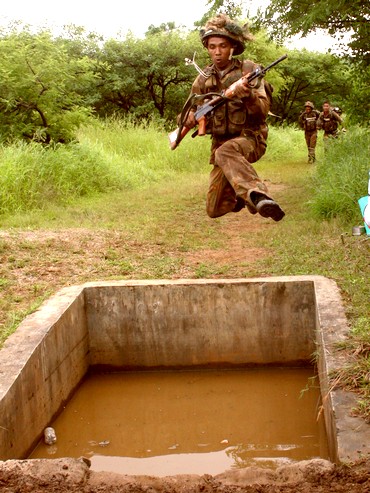
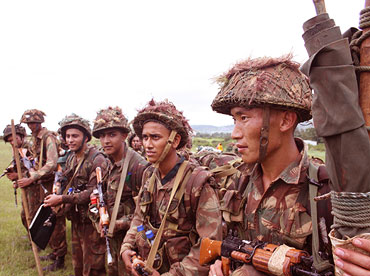
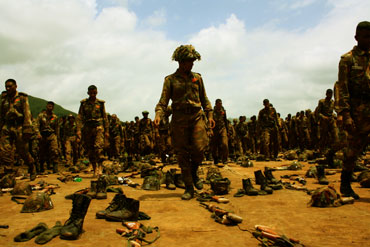
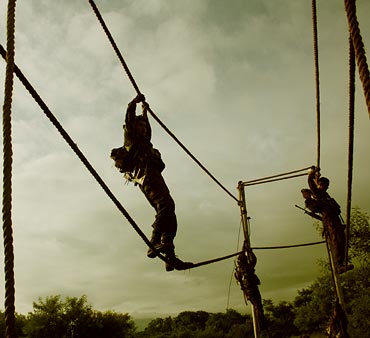
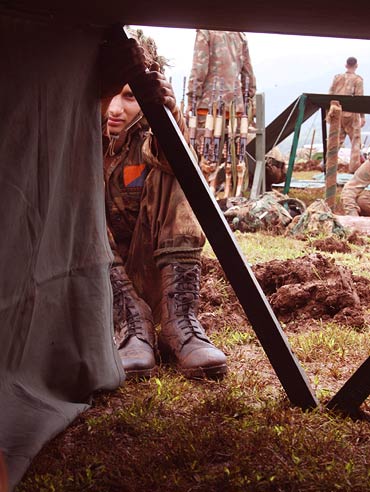
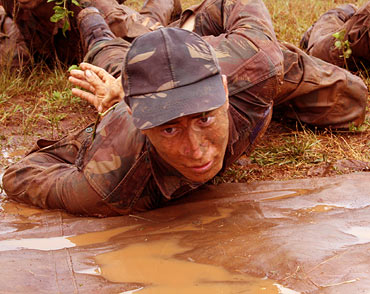
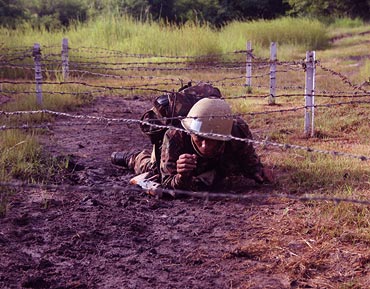
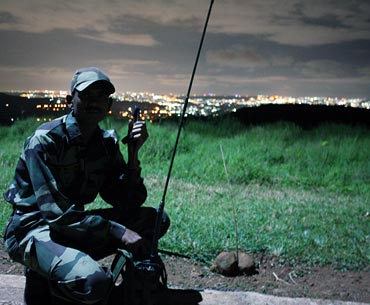

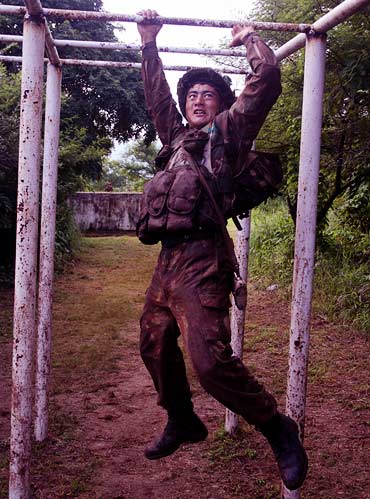
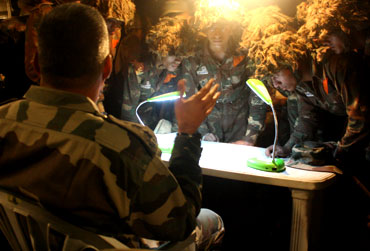
Comment
article